|
Books Should Be Free Loyal Books Free Public Domain Audiobooks & eBook Downloads |
|
|
Books Should Be Free Loyal Books Free Public Domain Audiobooks & eBook Downloads |
|
Top Authors |
|---|
|
Book type:
Sort by:
|
By: George Washington Plunkitt (1842-1924) | |
|---|---|
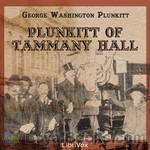 Plunkitt of Tammany Hall
Plunkitt of Tammany Hall
“I seen my opportunities and I took ‘em.”, George Washington Plunkitt of Tamminy Hall. There’s honest graft and dishonest graft according to Plunkitt. Listen to this candid discourse from a 19th century politician, and decide for yourself if things have changed. | |
By: William Healy, Mary Healy | |
|---|---|
 Pathological Lying, Accusation, and Swindling – A Study in Forensic Psychology
Pathological Lying, Accusation, and Swindling – A Study in Forensic Psychology
This work describes and analyzes several cases of pathological behavior. The interest comes not only from the cases themselves, but also from the of-its-time analysis which is mired in what we now know to be wrong thinking about mental illness, sexuality, gender, and race. - written by Mary Schneider | |
By: John Mark | |
|---|---|
 Jesus of Nazareth, A Biography
Jesus of Nazareth, A Biography
"Jesus of Nazareth, a Biography, by John Mark," recognizes the author of the second Gospel as that "John, whose surname was Mark" (Acts 15:37), whom Barnabas chose as companion when he sailed for Cyprus on his second missionary journey. In making use of the new title, the plan of the Editor is to present "The Gospel: According to Mark" as it would be printed were it written in the twentieth rather than the first century. (Introduction from Forward, by D. Appleton & Co, Publishers, 1922) | |
By: Leigh Brackett (1915-1978) | |
|---|---|
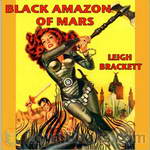 Black Amazon of Mars
Black Amazon of Mars
Carrying out the last wishes of a comrade, mercenary Eric John Stark takes on the task of returning a stolen talisman to a walled city near the Martian pole; a city that guards the mysterious Gates of Death. Now all he has to do is get past the brutal clans of Mekh and the shadowy Lord Ciaran to get to Kushat where they’ll probably attempt to kill him. All while he tries to hold on to a talisman that imprints ancient memories of the Gates in his mind. That’s not easy for a human raised by Mercurian aborigines... | |
By: Marcel Allain (1885-1969) | |
|---|---|
 Fantômas
Fantômas
Fantômas is the first of 32 novels penned from 1911 to 1913 by Marcel Allain and Pierre Souvestre. The title character is a ruthless thief and killer, a bloodthirsty successor to LeBlanc's Arsène Lupin. The first five novels were made into silent film serials. The character and the movies caught the eye of the French Surrealists who admired the primal violence of Fantômas, as well as his portrayal in the films, which are considered landmarks in French Cinema. In Fantômas, the Marquise de Langrune is savagely murdered and Inspector Juve, who is obsessed with capturing Fantômas, arrives to solve the murder. | |
 Messengers of Evil
Messengers of Evil
Fantômas was introduced a few years after Arsène Lupin, another well-known thief. But whereas Lupin draws the line at murder, Fantômas has no such qualms and is shown as a sociopath who enjoys killing in a sadistic fashion. He is totally ruthless, gives no mercy, and is loyal to none, not even his own children. He is a master of disguise, always appearing under an assumed identity, often that of a person whom he has murdered. Fantômas makes use of bizarre and improbable techniques in his crimes, such as plague-infested rats, giant snakes, and rooms that fill with sand... | |
 A Nest of Spies
A Nest of Spies
| |
 A Royal Prisoner
A Royal Prisoner
| |
By: Valmiki | |
|---|---|
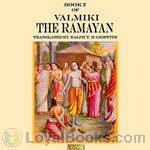 The Ramayana Book 2
The Ramayana Book 2
The Ramayana is an ancient Sanskrit epic. It is attributed to the Hindu sage Valmiki and forms an important part of the Hindu canon (smṛti). The Ramayana is one of the two great epics of India, the other being Mahabharata. It is the story of Rama, who emabrks on an epic journey followed by the fight with Ravana, the demon king who abducted Rama's wife, Sita. The epic depicts the duties of relationships, portraying ideal characters like the ideal servant, the ideal brother, the ideal wife and the ideal king. (Introduction by Om123) | |
 Hindu literature : Comprising The Book of good counsels, Nala and Damayanti, The Ramayana, and Sakoontala
Hindu literature : Comprising The Book of good counsels, Nala and Damayanti, The Ramayana, and Sakoontala
| |
By: William Butler Yeats (1865-1939) | |
|---|---|
 The Wild Swans at Coole
The Wild Swans at Coole
The Wild Swans at Coole is a collection of poems by William Butler Yeats, first published in 1917. It is also the name of a poem in that collection. The Wild Swans at Coole is in the "middle stage" of Yeats' writing and is concerned with, amongst other themes, Irish nationalism and the creation of an Irish aesthetic. | |
 The Celtic Twilight
The Celtic Twilight
| |
 Ideas of Good and Evil
Ideas of Good and Evil
| |
 The Wind Among the Reeds
The Wind Among the Reeds
| |
 The Secret Rose
The Secret Rose
| |
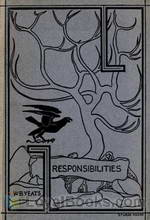 Responsibilities and other poems
Responsibilities and other poems
| |
 The Trembling of the Veil
The Trembling of the Veil
| |
 Seven Poems and a Fragment
Seven Poems and a Fragment
| |
 The Countess Cathleen
The Countess Cathleen
| |
 The Unicorn from the Stars and Other Plays
The Unicorn from the Stars and Other Plays
| |
 Rosa Alchemica
Rosa Alchemica
| |
 In The Seven Woods Being Poems Chiefly of the Irish Heroic Age
In The Seven Woods Being Poems Chiefly of the Irish Heroic Age
| |
 The Hour Glass
The Hour Glass
| |
 Discoveries A Volume of Essays
Discoveries A Volume of Essays
| |
 The Land of Heart's Desire
The Land of Heart's Desire
| |
 Reveries over Childhood and Youth
Reveries over Childhood and Youth
| |
 Per Amica Silentia Lunae
Per Amica Silentia Lunae
| |
 Two plays for dancers
Two plays for dancers
| |
 Four Years
Four Years
| |
 The Cutting of an Agate
The Cutting of an Agate
| |
 Mosada A dramatic poem
Mosada A dramatic poem
| |
 Stories of Red Hanrahan
Stories of Red Hanrahan
| |
 Synge and the Ireland of His Time
Synge and the Ireland of His Time
| |
By: Abraham Tomlinson | |
|---|---|
 The Military Journals of Two Private Soldiers, 1758-1775
The Military Journals of Two Private Soldiers, 1758-1775
“Perceiving that much of the intrinsic value of these Journals would consist in a proper understanding of the historical facts to which allusions are made in them, I prevailed upon Mr. Lossing, the well-known author of the “Pictorial Field-Book of the Revolution” to illustrate and elucidate these diaries by explanatory notes. His name is a sufficient guaranty for their accuracy and general usefulness” | |
By: Sara Cone Bryant (1873-?) | |
|---|---|
 How to Tell Stories to Children, and Some Stories to Tell
How to Tell Stories to Children, and Some Stories to Tell
Sara Cone Bryant was an educator and storyteller who wrote several books on the importance of oral storytelling to children, and stories to tell children. This volume expounds on her theories and practices of telling stories to children, and provides several examples. Her conversational writing style makes this work as relevant for parents and teachers as it was 90 years ago. | |
 Stories to Tell to Children
Stories to Tell to Children
| |
 Stories to Tell Children Fifty-Four Stories With Some Suggestions For Telling
Stories to Tell Children Fifty-Four Stories With Some Suggestions For Telling
| |
By: Carey Rockwell | |
|---|---|
 Stand by for Mars
Stand by for Mars
Tom Corbett - Space Cadet was one of the first multimedia sensations. In the 1950s the character had his own radio show, TV series, comic book, breakfast cereal, and a line of young-adult novels. A cross between "Tom Brown's School Days" and Horatio Hornblower (and loosely based upon Robert A. Heinlein's novel "Space Cadet"), the books follow the adventures of Tom and his friends Roger Manning and Astro as they work their way through Space Academy to become officers of the Solar Guard. Along the way they tangle with space pirates, smugglers, and the threat of demerits for breaking the rules... | |
 Danger in Deep Space
Danger in Deep Space
| |
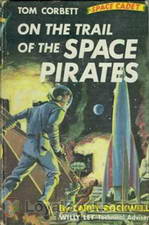 On the Trail of the Space Pirates
On the Trail of the Space Pirates
Tom Corbett is the main character in a series of Tom Corbett — Space Cadet stories that were depicted in television, radio, books, comic books, comic strips, and other media in the 1950s. The stories followed the adventures of Corbett and other cadets at the Space Academy as they train to become members of the Solar Guard. The action takes place at the Academy in classrooms and bunkrooms, aboard their training ship the rocket cruiser Polaris, and on alien worlds, both within our solar system and in orbit around nearby stars... | |
 Sabotage in Space
Sabotage in Space
This book is part of the on-going adventures of Tom Corbett in the Space Cadet Stories. Tom, Astro and Roger are determined to find the saboteurs but get framed in the process, risking court martial and expulsion from the Space Academy. NOTE: Carey Rockwell is a pseudonym used by Grosset & Dunlap. It is unknown who wrote the books. | |
By: Kathleen Norris | |
|---|---|
 Mother
Mother
With seven children and a home to take care of, Margaret wondered how her Mother could be so happy living a life that seemed all drudgery. As Margaret has new experiences, she comes to realize that “her mother was not only the truest, the finest, the most generous woman she had ever known, but the happiest as well”. | |
By: Emperor of Rome Marcus Aurelius (121-180) | |
|---|---|
 Thoughts of Marcus Aurelius Antoninus
Thoughts of Marcus Aurelius Antoninus
| |
 Thoughts of Marcus Aurelius
Thoughts of Marcus Aurelius
| |
By: Barton Wood Currie | |
|---|---|
 Officer 666
Officer 666
Bored with his life as a wealthy businessman's only son, Travers Gladwin learns of a plot by a renowned art burglar to rob his house, so rather than thwart the planned burglary, he borrows a police uniform from a friend and decides to confront the robber by posing as an officer. When the burglar arrives at the house, he tries to pass himself off as Travers Gladwin. From there, things only get more complicated, including the arrival of the burglar's girlfriend who believes that her beau is the wealthy man's son. Comical and timely, the book was made into a movie multiple times, each hugely successful. | |
By: Clara Reeve (1729-1807) | |
|---|---|
 The Old English Baron
The Old English Baron
The story follows the adventures of Sir Philip Harclay, who returns to medieval England to find that the castle seat and estate of his friend Lord Lovel have been usurped. A series of revelations, horrors and betrayals climax in a scene of single combat in which good battles evil for the return of the prize. | |
By: Doris Stevens (1892-1963) | |
|---|---|
 Jailed for Freedom
Jailed for Freedom
A first-hand account of the 1913-1919 campaign of American suffragists, detailing their treatment at the hands of the courts, and the true conditions of their incarceration. | |
By: Elsie Spicer Eells | |
|---|---|
 Fairy Tales from Brazil
Fairy Tales from Brazil
This book, subtitled "How and Why Tales from Brazilian Folk-Lore", is a collection of short stories, most of them etiologial myths from Brazilian Indian Folklore. | |
 Tales of Giants from Brazil
Tales of Giants from Brazil
| |
By: Robert Tressell | |
|---|---|
 The Ragged Trousered Philanthropists
The Ragged Trousered Philanthropists
Clearly frustrated at the refusal of his contemporaries to recognise the iniquity of society, Tressell’s cast of hypocritical Christians, exploitative capitalists and corrupt councillors provide a backdrop for his main target — the workers who think that a better life is “not for the likes of them”. Hence the title of the book; Tressell paints the workers as “philanthropists” who throw themselves into back-breaking work for poverty wages in order to generate profit for their masters... | |
By: Charles W. Diffin (1884-1966) | |
|---|---|
 Two Thousand Miles Below
Two Thousand Miles Below
A science fiction novel that was originally produced in four parts in the publication: Astounding Stories in June, September, November 1932, January 1933. The main character is Dean Rawson, who plans on discovering a way of mining power from a dead volcano, but ends up discovering more than he bargained for. | |
By: Clara Barton (1821-1912) | |
|---|---|
 A Story of the Red Cross Glimpses of Field Work
A Story of the Red Cross Glimpses of Field Work
| |
By: Andrew Jackson (1767-1845) | |
|---|---|
 State of the Union Address
State of the Union Address
| |
By: Edwin E. Slosson | |
|---|---|
 Creative Chemistry
Creative Chemistry
Slosson reviews the transformation of alchemistry from an obscure and imprecise practice to the science of chemistry. Along the way, he explains how the modern industrial world now relies on fertilizers, explosives, textile materials, polymers and metals.By exploring the properties of a once undervalued element, the high strength of vanadium steel made the Ford car possible. Another element, cerium, appears in butane lighters and was once seen as a threat to the match industry in France.In his chapter on oils, Slosson reviews the development of hydrogenated oils, especially during WWII, in the search for a way to reuse otherwise discarded components of corn and cottonseed... | |
By: George Müller (1805-1898) | |
|---|---|
 Answers to Prayer, from George Müller's Narratives
Answers to Prayer, from George Müller's Narratives
Mr. Brooks, in this compilation, has endeavored to select those incidents and practical remarks from Mr. Müller's Narratives, that show in an unmistakeable way, both to believers and unbelievers, the secret of believing prayer, the manifest hand of a living God, and His unfailing response, in His own time and way, to every petition which is according to His will. (From the Preface) | |
By: Miles Franklin | |
|---|---|
 My Brilliant Career
My Brilliant Career
Sybella “There is no plot in this story, because there has been none in my life or in any other life which has come under my notice. I am one of a class, the individuals of which have no time for plots in their life, but have all they can do to get their work done without indulging in such a luxury”. Like the author Miles Franklin, Sybella grows up in the bush, and as her family’s fortunes decline, so her feelings rise that life should hold more for her than the relentless hard physical work farming marginal land in times of drought. | |
By: William Sangster (1808-1888) | |
|---|---|
 Umbrellas and Their History
Umbrellas and Their History
A whimsically serious look at the umbrella and society. | |
By: E. T. A. Hoffmann (1776-1822) | |
|---|---|
 Weird Tales, Vol. II.
Weird Tales, Vol. II.
| |